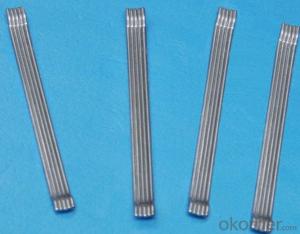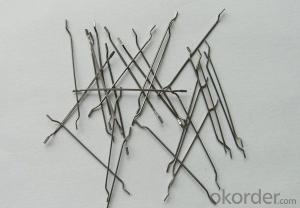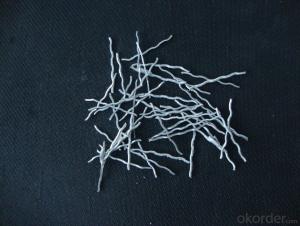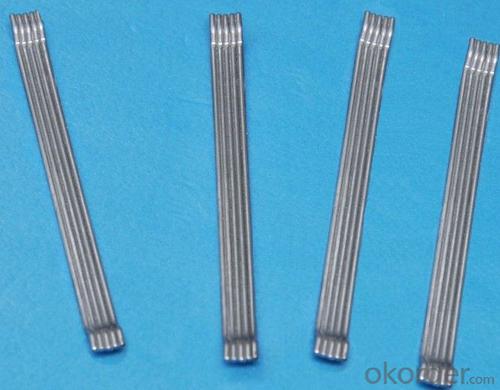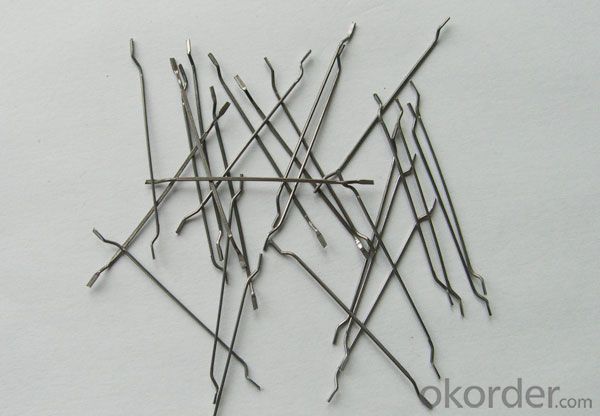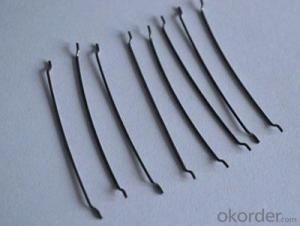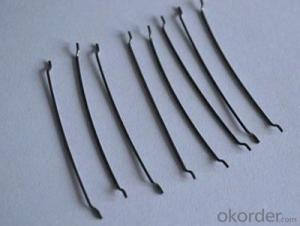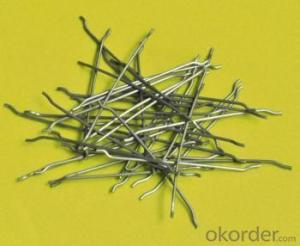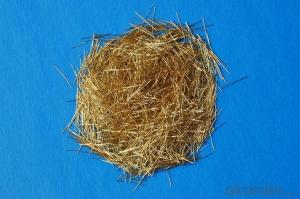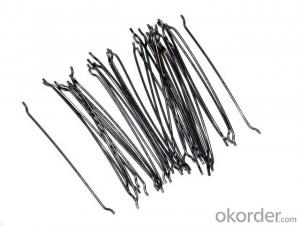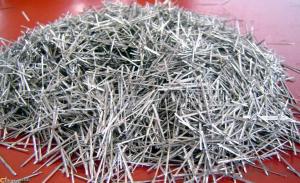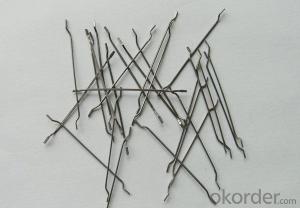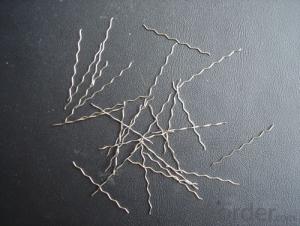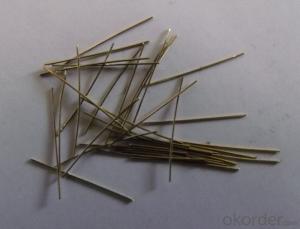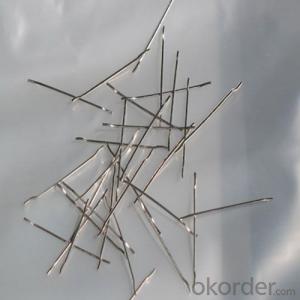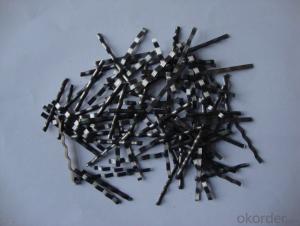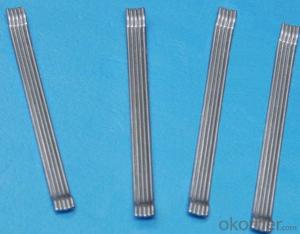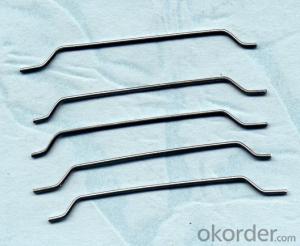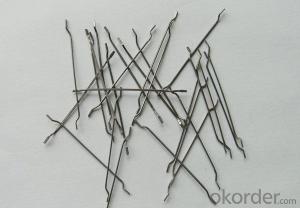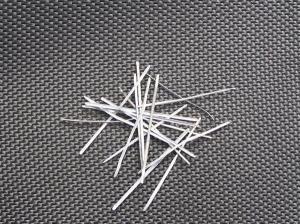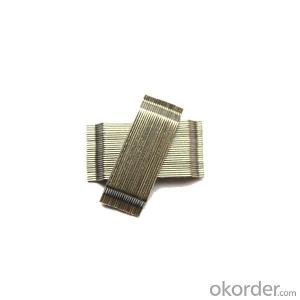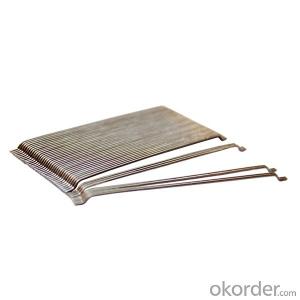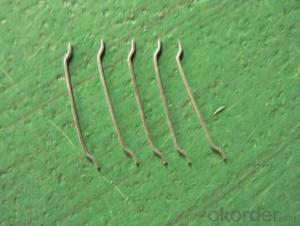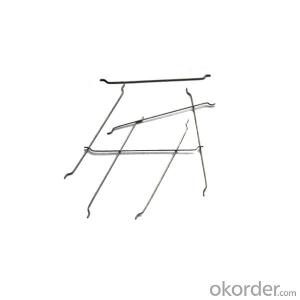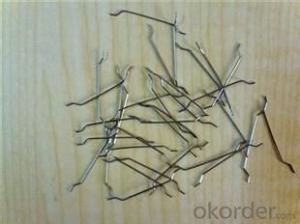Melt Extract Stainless Steel Fiber Straight Type CNBM from China
- Loading Port:
- Tianjin
- Payment Terms:
- TT OR LC
- Min Order Qty:
- 1000 kg
- Supply Capability:
- 30000 kg/month
OKorder Service Pledge
OKorder Financial Service
You Might Also Like
Quick Details
Place of Origin: Jiangsu, China (Mainland)
Model Number: HT-ST
Material: Steel
Specifications
Steel fibers today offer the designer and constructer state-of-the-art technology for use as reinforcement in many concrete elements and applications. There are many varieties of styles, shapes and sizes of steel fibers in the market today.
Introducing steel fibers into the concrete mix provide new mechanical properties. We now have a new material, with improved mechanical properties that can enhance structural applications. The fibers can be included as a substitute for the common steel reinforcement, or as a complement, or for a better performance for strain that the common reinforcement can't absorb.
In mechanical and performance terms, by adding steel fibers to the concrete mix you can:
Increase and get a stable of tensile strength under flexion load, which produces a ductile behavior
Increase impact resistance
Increase cyclic loads of resistance (fatigue effect)
Increase prevention of the plastic shrinkage crack
Increase the concrete performance against thermal variations
Get minor permeability
Picture
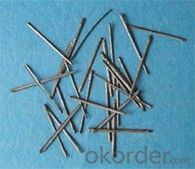
Steel fiber straight type
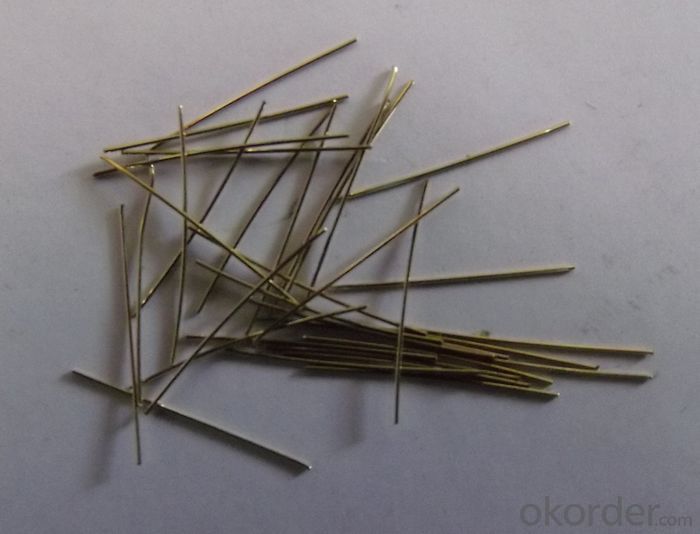
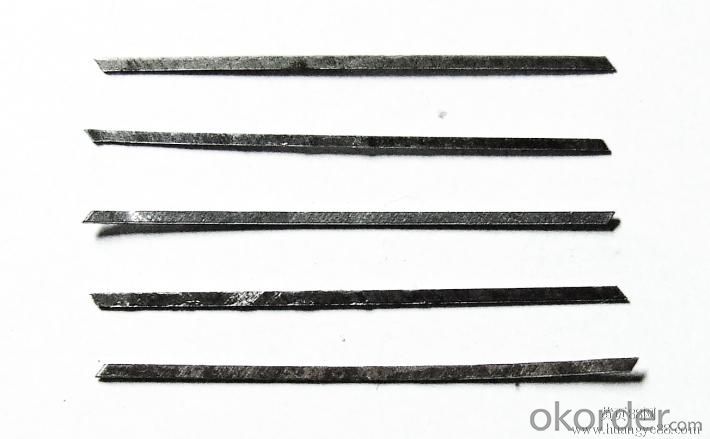
FAQ
certificated: ISO 9001
Technical advantages of Daye steel fiber:
A. Improve mechanical performance of concrete
B. Provide uniform distribution throughout concrete with excellent mixing
C. No balling or caking by adopt correct mixing method
D. Reduce concrete volume
E.Save construction time and cost
F.Reduce excavation volume
G.Available for jointless floor.
- Q: What is the average length of melt extract stainless steel fiber?
- The specific application and manufacturing process often determine the average length of melt extract stainless steel fiber. Generally, this fiber ranges from a few millimeters to a few centimeters, which is ideal for improving the mechanical properties and durability of materials like concrete, composites, and refractories. It is important to mention that manufacturers can provide various lengths of melt extract stainless steel fiber to meet the specific requirements and preferences of their customers.
- Q: How does melt extract stainless steel fiber affect the permeability of concrete to water?
- The permeability of concrete to water can be significantly influenced by the use of melt extract stainless steel fiber. To enhance the durability and overall performance of the structure, stainless steel fibers are introduced into concrete mixtures. By incorporating stainless steel fibers into concrete, a three-dimensional network of reinforcement is formed within the matrix. This network acts as a barrier, limiting the flow of water through the concrete. The fibers create a complex pathway for water molecules, thereby reducing the material's permeability. Furthermore, the presence of stainless steel fibers plays a role in reducing the occurrence of microcracks in concrete. Microcracks can arise from various factors such as shrinkage, temperature fluctuations, and external forces. These cracks create openings for water to infiltrate the concrete, thereby increasing its permeability. However, the inclusion of stainless steel fibers helps manage and minimize the development and propagation of these cracks, subsequently decreasing the concrete's permeability. Additionally, stainless steel fibers bring added advantages to the concrete matrix by enhancing its tensile strength and ductility. This increased strength allows the concrete to better endure external loads and pressures, thus diminishing the likelihood of crack formation and water seepage. To summarize, the introduction of melt extract stainless steel fiber into concrete has a positive impact on its permeability to water. The fibers establish a barrier that restricts the movement of water molecules and assist in controlling the formation of microcracks, ultimately reducing the concrete's permeability.
- Q: Can melt extract stainless steel fiber be used in the construction of cooling towers?
- Yes, melt extract stainless steel fiber can be used in the construction of cooling towers. This type of fiber is specifically designed to enhance the strength, durability, and resistance to corrosion in various applications, including cooling towers. Its high melting point and excellent thermal conductivity make it an ideal choice for withstanding the extreme temperature and moisture conditions in cooling tower environments.
- Q: How does the addition of melt extract stainless steel fiber impact the shrinkage of concrete?
- The addition of melt extract stainless steel fiber can have a significant impact on the shrinkage of concrete. Stainless steel fibers are added to concrete to enhance its strength, durability, and crack resistance. When these fibers are incorporated into the concrete mix, they provide reinforcement and reduce the overall shrinkage of the material. Concrete shrinkage is a natural phenomenon that occurs as the material dries and loses moisture. This shrinkage can lead to the development of cracks, which can compromise the integrity and longevity of the concrete structure. However, by adding melt extract stainless steel fibers, the shrinkage is mitigated, and the potential for cracks is greatly reduced. The stainless steel fibers work by creating a three-dimensional network within the concrete matrix. As the concrete shrinks, the fibers resist the tensile forces that develop, preventing the formation of cracks. The fibers act as reinforcement, distributing the stress throughout the material and improving its overall performance. Furthermore, the addition of melt extract stainless steel fibers can also enhance the post-cracking behavior of concrete. In the event that cracks do occur, the fibers provide bridging reinforcement across the cracks, preventing them from propagating further and improving the structural integrity of the concrete. Overall, the addition of melt extract stainless steel fibers to concrete results in a significant reduction in shrinkage and an improvement in crack resistance. This not only enhances the durability and longevity of the concrete structure but also ensures its ability to withstand external forces and environmental conditions.
- Q: Who has steel fiber concrete mix design?
- Determination of steel fiber content:The incorporation rate of selected fibers was P=1.5%,T0= (78.67*P) kg=78.67*1.5=118kg;
- Q: Can melt extract stainless steel fiber be used in high-rise or tall buildings?
- Yes, melt extract stainless steel fiber can be used in high-rise or tall buildings. This type of fiber is known for its high strength and durability, making it suitable for various construction applications, including reinforcing concrete in tall buildings. It can enhance the structural integrity and resistance to cracking, improving the overall performance and safety of the building.
- Q: What is the recommended mix design when using melt extract stainless steel fiber in concrete?
- Achieving an optimal mix design for concrete with melt extract stainless steel fiber involves finding a balance between workability, strength, and durability. First and foremost, consideration must be given to the dosage of the fiber. The recommended dosage typically falls within the range of 25 to 75 kg/m3, depending on the desired concrete properties. Higher dosages improve crack resistance and impact strength, while lower dosages may suffice for enhancing flexural strength. Regarding the proportions of the concrete mix, it is advisable to increase the content of cementitious materials, such as cement or fly ash, to ensure proper bonding between the stainless steel fibers and the concrete matrix. This promotes better dispersion and distribution of the fibers throughout the concrete. To maintain workability, the use of superplasticizers or water reducers can be advantageous. These chemical admixtures enhance the flowability of the concrete while reducing water content, thus minimizing the risk of fiber balling or clumping. Furthermore, adequate curing of the concrete containing melt extract stainless steel fibers is crucial. Proper moist curing or the application of curing compounds helps prevent early-age shrinkage and drying shrinkage, thereby enhancing the overall durability of the concrete. Ultimately, the recommended mix design for concrete with melt extract stainless steel fiber may vary depending on specific project requirements, including desired strength, durability, and application. It is advisable to consult with a qualified engineer or concrete specialist to determine the most suitable mix design for a particular project.
- Q: How does melt extract stainless steel fiber improve the abrasion resistance of concrete?
- The abrasion resistance of concrete can be improved by the addition of melt extract stainless steel fiber through various mechanisms. Firstly, incorporating stainless steel fibers into the concrete matrix enhances its tensile strength, thereby making it more resistant to cracking and spalling caused by abrasive forces. This is particularly crucial in areas with high traffic or in industrial settings where the concrete undergoes significant wear and tear. Secondly, the stainless steel fibers play a reinforcing role within the concrete, forming a three-dimensional network that enhances the overall durability and toughness of the material. Consequently, the concrete becomes less susceptible to abrasive damage and can withstand higher levels of mechanical stress. Furthermore, the unique attributes of stainless steel, such as its resistance to corrosion and high melting point, make it an ideal material for enhancing abrasion resistance. Unlike conventional steel fibers, stainless steel fibers do not rust or corrode, even in harsh environments, ensuring the long-term durability of the concrete structure. Moreover, the small diameter and high aspect ratio of melt extract stainless steel fibers further contribute to the improved abrasion resistance. These fibers are typically very fine and uniformly dispersed throughout the concrete, creating a dense network that effectively withstands abrasive forces and prevents crack formation. Overall, the addition of melt extract stainless steel fiber to concrete enhances its abrasion resistance by increasing tensile strength, providing reinforcement, offering corrosion resistance, and optimizing the microstructure of the material. This results in a concrete surface that is more durable and long-lasting, capable of withstanding heavy traffic and abrasive conditions.
- Q: Does melt extract stainless steel fiber improve the flexural strength of concrete?
- Yes, melt extract stainless steel fiber does improve the flexural strength of concrete. This type of fiber is manufactured by melting stainless steel and then extracting it into thin fibers. These fibers are added to concrete mixtures to enhance its mechanical properties, including flexural strength. When melt extract stainless steel fibers are mixed into concrete, they act as reinforcement by distributing stresses more evenly throughout the material. This helps to prevent cracking and increase the overall strength of the concrete in bending or flexural conditions. Additionally, the high tensile strength and ductility of stainless steel fibers further contribute to the improved flexural strength of concrete. These fibers can effectively resist the tensile forces that occur during flexural loading, resulting in a more durable and resilient concrete structure. Overall, the incorporation of melt extract stainless steel fibers in concrete significantly enhances its flexural strength, making it a popular choice for various applications such as pavements, industrial floors, and structural elements subjected to bending or flexural forces.
- Q: Can melt extract stainless steel fiber be used in pre-stressed concrete?
- Yes, melt extract stainless steel fiber can be used in pre-stressed concrete. The addition of stainless steel fibers in pre-stressed concrete can provide increased ductility and crack resistance, enhancing the overall performance and durability of the concrete structure. The stainless steel fibers act as reinforcement by dispersing the stress and preventing the propagation of cracks. This helps to improve the structural integrity of the pre-stressed concrete and increases its resistance to mechanical and environmental stresses. Additionally, the use of melt extract stainless steel fibers in pre-stressed concrete can also contribute to reducing the potential for corrosion, as stainless steel is highly resistant to rust and other forms of degradation. Overall, the incorporation of melt extract stainless steel fibers in pre-stressed concrete can improve its strength, flexibility, and longevity.
Send your message to us
Melt Extract Stainless Steel Fiber Straight Type CNBM from China
- Loading Port:
- Tianjin
- Payment Terms:
- TT OR LC
- Min Order Qty:
- 1000 kg
- Supply Capability:
- 30000 kg/month
OKorder Service Pledge
OKorder Financial Service
Similar products
Hot products
Hot Searches
Related keywords
